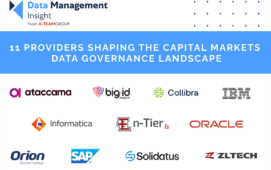Deutsche Bank is currently evaluating a number of reference data management solutions to source, cleanse, manage and distribute data for use primarily within its risk management functions. The vendors have responded to a Request for Information (RFI) and a decision is expected to be made in the first quarter of 2005.
Deutsche Bank did not return calls by press time. But sources close to the plans say that the objective outlined in the RFI is to provide improved quality and timeliness of historical and derived data used in risk processes. The bank is also said to be looking for a robust platform and flexible business model that will allow growth for other consumers throughout the enterprise to take data, such as static market and client data, from the platform.
This endeavour falls under the remit of Deutsche Bank’s global technology and operations group, headed by Neil Innes, which has been working on a wide-ranging DB Reference Data Programme since 2002. This particular project is said to have grown from Deutsche Bank’s Risk Controlling Group and is being run by Gary Stevens.
The bank is essentially looking to outsource the data management function, so the vendor would manage functions such as data acquisition, cleansing and data derivations (based on Deutsche Bank’s own models). But the platform would reside onsite, say sources, and Deutsche Bank plans to maintain control over data sources, business rules, and the implementation and growth of the system, an approach it is calling ‘Smart Source’.
It is believed that DSL – an India-based company originally spun off from Deutsche Bank in the 1990’s – which has provided the technology platform for the bank’s wider reference data management implementation, is involved in this project. According to sources, other vendors believed to be involved in the initial stages include Accenture, Asset Control, Capco, Cicada, IBM, Infosys, Rimes, Riskmetrics, Soliton and SunGard, although this could not be confirmed.
The data management platform will operate across both the business and IT functions at Deutsche Bank. Within the IT-related services, the vendor would be required to provide a core platform for storage and management of historical market data, manage the importing of data from a variety of vendors, provide validation functions, define multiple golden copies, provide an audit trail as well as security and permissioning functions, and provide tools to view and extract data. Within the business related services, the platform would be required to identify and validate golden sources and then configure various packages of the right golden sources for downstream applications.
The RFI was distributed in October and Deutsche Bank is now conducting initial evaluations of the responding vendors’ offerings. It is expected that a shortlist of vendors will be decided in December with the proposals being considered by a steering committee. Sources suggest a final decision could be made by April of next year.
Deutsche Bank has already put considerable work into its DB Reference Data Programme, which aims to develop a single model for client, instrument and organizational data. One of the managing group’s key focuses has been to establish management buy-in through its Corporate Reference Data Governance Forum, which is responsible for defining a reference data strategy and ensuring the strategy is understood and implemented across the bank (see Reference Data Review, June 2004).
As part of this strategy, the bank has already put in place a risk-based approach to ensure compliance with Know Your Client and Anti-Money Laundering (AML) regulatory requirements (see Reference Data Review, September 2004). Here, existing entity data was reviewed and new account data now follows a set procedure, and risk parameters have been assigned to counterparties. DSL is a technology provider for this project, and Cicada provides advisory and cleansing services.
Subscribe to our newsletter



